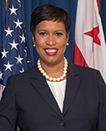Washington, DC
District of Columbia Confirms Case of Measles in 2015
Tuesday, February 3, 2015
(Washington, DC) — Today, the District of Columbia Department of Health (DOH) confirms a single case of measles in Washington, DC this year.
The current case of measles in the District is an isolated case resulting from international travel and is not linked to the ongoing measles cases in California. DOH officials continue to monitor the situation and encourage residents, especially young children to get vaccinated.
“Getting vaccinated is the best way to prevent the harmful spread of measles in and around the District of Columbia. It is imperative for residents to understand the effect measles can have on the human body and the public health threat it poses to young unvaccinated children and adults. This is why we are encouraging families to visit their primary care physician to verify their vaccination status and to contact their healthcare provider if residents experience symptoms of measles,” said DOH Director, Dr. LaQuandra S. Nesbitt.
Measles is a highly contagious illness that may have the following symptoms: fever, pink or red eyes and cough, followed by a red blotchy rash that appears on the 3rd to 7th day beginning on the face and spreads to the rest of the body. The disease is more severe in infants and adults.
Transmission:
Measles is spread from person-to-person by direct contact with nasal or throat secretions of infected person or through the air from an infected person’s coughing or sneezing. Symptoms usually appear within 7 to 18 days, although they may occur as late as 21 days, after exposure. People who have not had the disease or who have not been successfully immunized are at risk for infection.
Prevention:
Measles can be prevented by a two dose vaccination. This is a safe and highly effective vaccine. The first dose of measles vaccine is usually given between 12 and 15 months of age. A second dose of vaccine is given at school entry (4 to 6 years of age). Both doses are generally given as combined measles, mumps, rubella (MMR) vaccine.
Residents should contact their health care provider to discuss MMR vaccination history as well as possible exposure to measles.
The last reported case of measles occurred in the District of Columbia in 2012.
For more information, visit doh.dc.gov.

